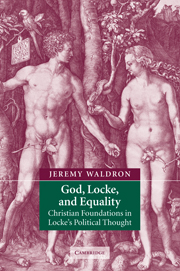Book contents
- Frontmatter
- Contents
- Preface
- Citations and abbreviations
- 1 Introduction
- 2 Adam and Eve
- 3 Species and the Shape of Equality
- 4 “The Democratic Intellect”
- 5 Kings, Fathers, Voters, Subjects, and Crooks
- 6 “Disproportionate and Unequal Possession”
- 7 “By Our Saviour's Interpretation”
- 8 Tolerating Atheists?
- Bibliography
- Index
7 - “By Our Saviour's Interpretation”
Published online by Cambridge University Press: 13 January 2010
- Frontmatter
- Contents
- Preface
- Citations and abbreviations
- 1 Introduction
- 2 Adam and Eve
- 3 Species and the Shape of Equality
- 4 “The Democratic Intellect”
- 5 Kings, Fathers, Voters, Subjects, and Crooks
- 6 “Disproportionate and Unequal Possession”
- 7 “By Our Saviour's Interpretation”
- 8 Tolerating Atheists?
- Bibliography
- Index
Summary
Anyone who reads the Two Treatises of Government, alert to their religious and theological character, will find it quite striking how much is made of Old Testament sources and how little of any teaching or doctrine from the Christian Gospels and Epistles. I mentioned at the very beginning of this book John Dunn's claim that Locke's whole frame of discussion in the Two Treatises is “saturated with Christian assumptions – and those of a Christianity in which the New Testament counted very much more than the Old.” Well, if Dunn is right, the saturation is so complete as to be virtually invisible. Jesus and St. Paul may be there in the background of Locke's theory of equality. Maybe. But they are well in the background, and their specific teachings are not appealed to at all, not even to resolve any of the conundrums which, in Chapter 3, we found associated with what Dunn calls “the normative creaturely equality of all men in virtue of their shared species-membership.”
By contrast, the Old Testament is all over the Two Treatises, the First Treatise especially. Actually, it may be a mistake to phrase this as a simple contrast between Old and New Testaments. In the Old Testament or Hebrew Scriptures – what Locke calls “the sacred ancient writings of the Jewish nation allowed by the Christians to be of divine original” (P&N: ii.483) – there is a considerable amount of legal, social, and political material (in the Mosaic law) that can safely be disregarded by non-Jews, as it was intended for the governance of the nation of Israel alone: “For no positive law whatsoever can oblige any people but those to whom it is given. ‘Hear, O Israel,’ sufficiently restrains the obligations of the law of Moses only to that people” (LCT: 42).
- Type
- Chapter
- Information
- God, Locke, and EqualityChristian Foundations in Locke's Political Thought, pp. 188 - 216Publisher: Cambridge University PressPrint publication year: 2002



